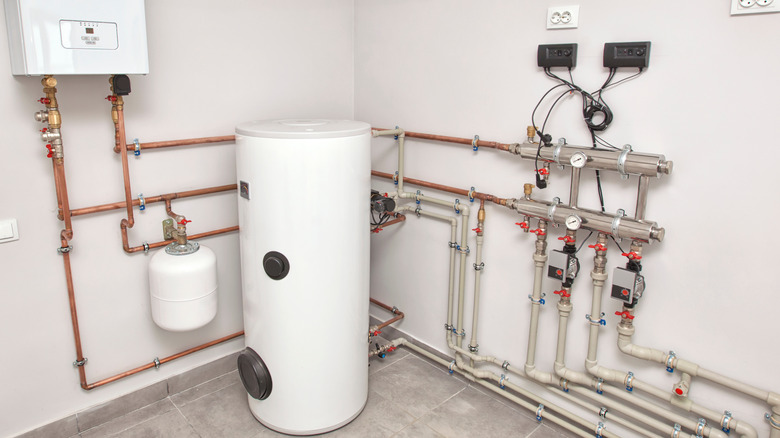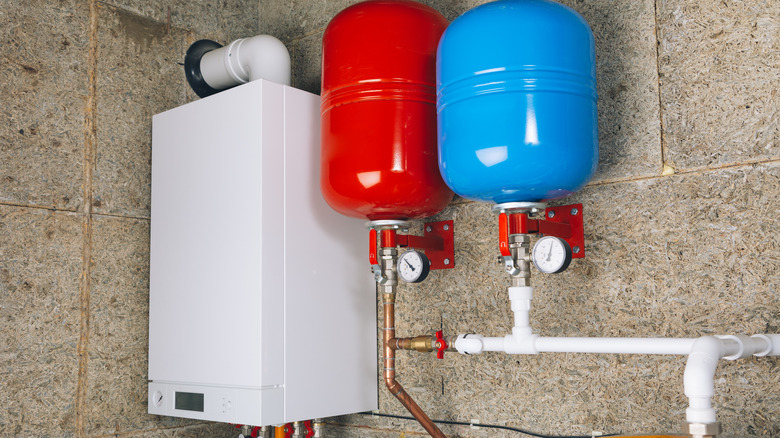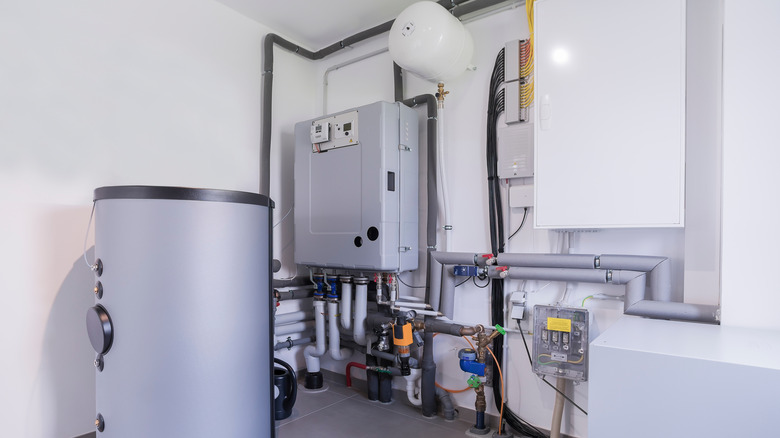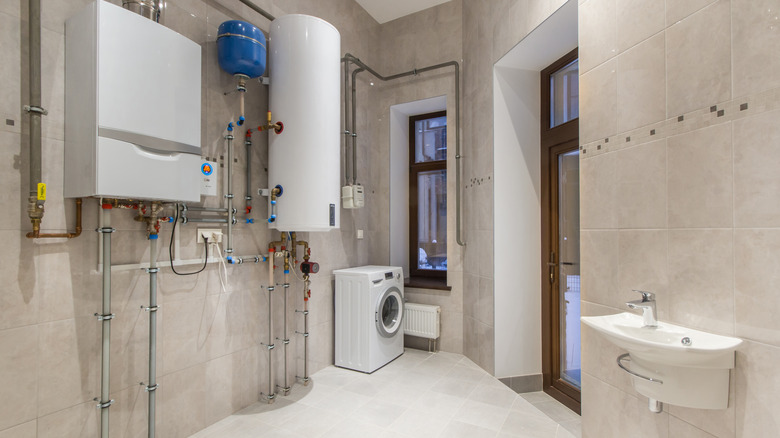How Much Does It Cost To Replace A Hot Water Heater?
When your water heater no longer produces enough hot water or you discover colored water flowing from your taps, these are signs that your old appliance has got to go. A water heater replacement is a significant project and you should be aware of the cost implications that come with the replacement. The two main factors are the price of the unit itself, and the labor to install it. According to HomeAdvisor, the national average cost of installing a new water heater is roughly $1,232 but the cost can fall anywhere between $829 and $1,642. HomeAdvisor also explains that this average does not account for additional plumbing service that you may require, so you should expect to pay a professional plumbing technician somewhere between $45 and $150 per hour of additional service.
There are a variety of unique situations and factors that are taken into account when determining the total cost to replace a hot water heater, and you should be aware so you can make an informed decision when purchasing a new unit. Read on to learn the intricate details that go into a replacement job, and why it is important and necessary to replace when the time is right.
Factors for cost
There are several factors that will ultimately determine how much you will end up spending for your water heater replacement. It is worth mentioning that replacing a hot water heater is relatively costly as compared to other home appliance replacements. Bob Vila details some of the different variables that affect the cost of replacement.
System location
Where you choose to place the water heater largely determines the overall materials and labor costs. Typically, replacements that must be done in less accessible places like the attic or the basement will cost more. This is due to the extra work technicians or plumbers must do to carry equipment up and down staircases. You should also carefully consider the location of the water heater so that whenever a leak occurs, it is easy to fix and also won't cause too much water damage.
Size and capacity
For the tank-style models, the greater the capacity of the water heater tank, the pricier the unit will be. The capacity is measured in gallons which ultimately determines how many people the water heater can serve. The most common sizes are 30 or 40-gallon tanks, which range from $270 to $900. This capacity comfortably serves a household of two people. Larger water heaters, such as an 80-gallon tank, will serve a household of over five people and cost anything between $1,000 and $3,000.
Type of water heater
Every water heater out there is either powered by natural gas or electricity. Initially, purchasing a natural gas-driven water heater is more expensive than their electric counterparts. In fact, the gas option can cost up to $200 more than an electric water heater model. While the gas option is not quite as energy-efficient as the electric model, it is, however, cheaper as far as long-term operation cost is concerned. The high electricity bills make the electric water heater model more expensive over time.
Tank vs tankless
The tankless models are significantly smaller than those that require large tanks, and thus take up less space. While this might seem like a good solution for less accessible areas, it's important to point out that the installation process is far more complicated. What's more, tankless water heater units cost up to three times more than equivalent units with a tank.
Additional costs
When making estimates for your water heater replacement, it is also wise to consider other additional costs that may be thrown your way. While labor and purchase of the appliance might be the bulk of the budget, take into account the following factors that may increase your overall expenditure, per Forbes Advisor.
Permits
A plumbing permit may be a requirement, depending on where you live. On average, plumbing permits cost between $50 and $1500, depending on the circumstances of your particular replacement. You can either apply for a permit yourself or let your contractor do so on your behalf and add the bill to the total invoice.
Tank removal services
If not included in the initial estimate and scope and you receive, you will have to pay out of pocket for the tank removal and disposal. Before a new tank is installed the older one must give way. The average cost of tank removal and disposal will depend on how large the tank is and how easy it is to access the tank. However, the whole cost ranges between $100 and $500.
Installing an expansion tank
If you have an older home, chances are the plumbing work did not involve the use of an expansion tank. The expansion tank is essentially a safety net that keeps the pipes from bursting when the water tank fails. Modern building codes in many jurisdictions require the inclusion of an expansion tank in conjunction with the replacement of a water heater, and the cost ranges between $40 and $350.
Warranty
Bob Vila explains that most water heater units come with a warranty. While the manufacturer might take care of the replacement cost in the event the appliance fails before the warranty expires, you may need to pay additional fees if you want to extend your warranty coverage.
Types of water heaters
One good thing about water heater replacement is that you can choose to replace your older unit with modern types. According to Home Stratosphere, there are five main water heater types:
The conventional tank option
This is the most common type of water heater and features a tank that holds water while the heating mechanism brings it to the right temperature. The tank comes in different sizes and is insulated, which allows it to retain the water temperature until ready for use. It's important to make sure your water heater has a tank with a suitable capacity for the members of your household. A too-small tank might mean you run out of available hot water and not have it on-demand as intended.
The tankless option
This is a modern innovation that promises a hot water supply on demand. Since it has no tank, water is warmed by a series of coils that heat water instantaneously. Similar to the tank option, this model too is available in different sizes to meet the needs of your household. Be sure to get the right size for your family size, lest the appliance fails to match the water usage.
Heat pump water heater
If you are looking for an energy-efficient option, a heat pump water heater should be at the top of your list. This water heater model is designed to operate without directly generating heat, but instead makes use of heat in the ground and in the air. Electricity is only used to move heat from the ground up into the air and to the water. Operation requires up to 60% less electricity compared to its counterparts.
Solar-powered water heaters
Solar water heaters operate using the energy harnessed from the sun. Installation of this appliance involves the strategic placement of solar panels on the roof for harnessing solar energy. The energy is then transferred through a series of coils that conducts heat that subsequently warms the water to the desired temperature. Solar-powered water heaters are particularly beneficial to those living in areas with plenty of sunshine.
Condensing water heater
This water heating model works under the same principle as the conventional water heater. The otherwise wasted exhaust gases that exit the house are instead redirected to heat water. It features a tank to hold water during heating and therefore, it is vital to select the right size for your household. This option is ideal for households that use natural gas as the main source of fuel.
Why do you need to replace your water heater?
The average life span of a water heater is typically 8 to 10 years, which means you will likely need to replace this appliance at some point. Here are some reasons why, as explained by Ace-Robbins, Inc.
Unusual sounds
If you notice loud and unusual noise emitting from your water heater tank, consider it an early warning sign that the unit has surpassed its usefulness and it is time for a replacement. These noises indicate issues such as failing heating elements, or sediment build-up in the tank.
Leaks
As soon as you notice a leak from your water heater, turn off power sources and water flow to allow the heater to cool off. Leaks are an indication of internal structural failure and in most cases, require immediate replacement.
Reduced performance
Diminished performance may manifest in issues such as the heater not producing enough hot water on demand, which usually indicates a failing heating element. You may also notice the problem with an increase in your monthly energy bills. If you experience these problems with a water heater that has given you service for close to a decade, the best thing to do is to replace the entire appliance.
Water discoloration
Brown water is often an indication that the tank is rusting from the inside. This can be a health hazard, and it is best to address it by replacing the water heater as soon as possible.
Benefits of replacing your water heater
Once a hot water heater is nearing the end of its life span, a complete replacement may be the best solution, as it can save you from the headache that comes with time and money spent on frequent repairs. There are plenty of benefits to replacing your water heater that makes the project worth the cost, as explained by Modern Plumbing Industries, Inc.
Save on space
If you are ready for an upgrade from a traditional tank model to a more innovative tankless model, you will have the added benefit of increasing available space in your storage area. These rectangular appliances are mounted vertically against the wall, freeing up floor space to give you more room to store other important items.
Efficiency
Modern water heater units are now not only designed to produce hot water, but also to do so in the most efficient manner possible. Every unit has an energy rating score that indicates the rate of hot water production versus the energy consumption. Appliances with higher energy rating scores are the most energy-efficient and will save you the most on your energy bills down the line.





